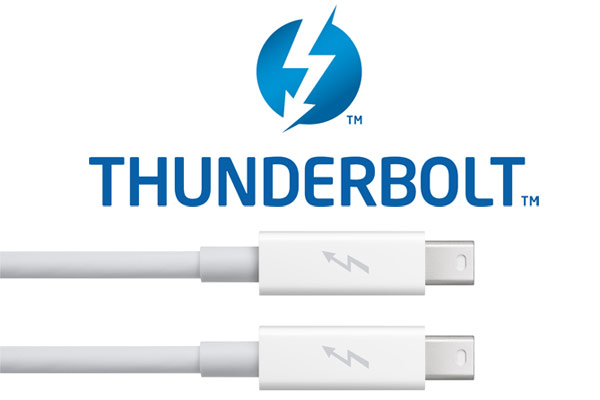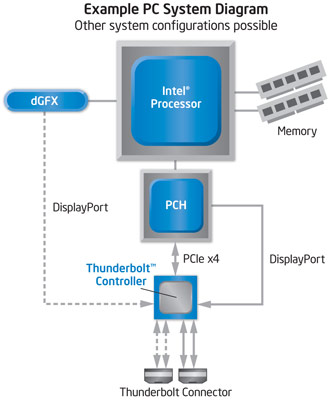Intel Intros New Thunderbolt Connection Standard. Is USB 3 in Trouble?
Intel's long-touted Light Peak high-speed connection technology is finally coming to market under the name "Thunderbolt." Today, the chipmaker announced that Apple's new line of MacBook Pros would be the first to ship with Thunderbolt ports, which are capable of carrying both data files and video over a single cable, speeding along at a whopping 10 GBps.
Designed to meet the needs of HD media creators, Thunderbolt can transfer an entire HD movie in under 30 seconds and drive displays with resolutions even higher than 1080p. Users will also be able to daisychain multiple devices together. According to Engadget, the wires will carry up to 10 watts of electricity (versus 900 milliamps for USB 3) so you can power Thunderbolt gadgets without plugging them into the wall.
Thunderbolt requires its own controller chip on the motherboard and has its own tiny connector, which Intel says is "suitable for mobile devices" so we assume it could even appear on phones or tablets. No Thunderbolt peripherals have been announced yet, but Intel has said it is working with display, storage, and other vendors on a new wave of devices. Engadget saw a demo with a prototype Promise RAID unit and a Cinema Display both connected to Thunderbolt and were impressed with its ability to play four uncompressed HD streams while transfering data at a rate of 600 to 700 MBps.
Thunderbolt versus USB 3.0
While we had previously heard from Intel reps that Light Peak (now Thunderbolt) was not meant to supplant USB 3.0 and could even end up carrying USB 3.0 signals on its wire, today's announcement sounds like it could be the start of a connection battle. In the fall, Intel's Nick Knupffer told us that "you could connect your laptop to a monitor with a Light Peak cable, but the display could also have a USB port, an Ethernet port, and maybe something else, and all that’s going along Light Peak. Light Peak is just the track. It's not the train."
However, Thunderbolt only supports DisplayPort and PCI Express connections, not USB 3.0 or Ethernet. And storage vendors such as LaCie and Western Digital have announced their intention to create Thunderbolt storage devices, which would cut right into USB's biggest market segment. At the same time, Intel has yet to say when and if it will add USB 3.0 support to its chipsets.
Sign up to receive The Snapshot, a free special dispatch from Laptop Mag, in your inbox.



